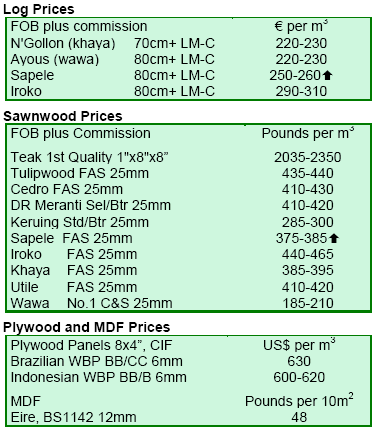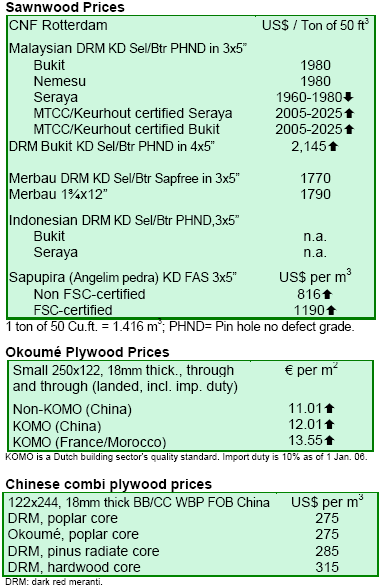|
Report
from the UK
UK economy shows continuing resilience
The Financial Times Stock Exchange Index reached a five year high in late October while the UK economy grew at
its highest rate for two years in the third quarter of the year, according to the Office of National Statistics
(ONS). However, retail sales posted a surprise drop in September (down 0.4%), with experts blaming an increase in utility
prices, less discounting and higher interest rates. Consumer spending was one of the main drivers of the UK
economy and there were concerns that it could wane.
UK house prices treble over a decade
House prices across the UK have almost trebled since mid-1990 according to Halifax. The average price has
risen 187%, an average increase of 19.6% a year. The number of mortgages for house buying approved by major
British banks continue to rise, 3% higher than a year ago. Meanwhile, Plimsoll Publishing Limited has published its
new analysis of the UK¡¯s timber merchants and importers,
with James Latham plc, a large importer and distributor of panel products, placed at the top tree. The report covers
988 companies.
World Bank put value on forest over pastures
The World Bank report on carbon trading as a useful tool to protect endangered rainforests by compensating nations that avoid deforestation, has again raised the profile of the
conservation bodies once again, putting more pressure on importers and traders to obtain legal and certified timber.
It has suggested that industrial states offset their carbon emissions by funding projects designed to reduce
deforestation in developing countries, where 5% of the world¡¯s rainforest is lost every decade. The bank
concludes that forest is more valuable if left to store carbon dioxide emissions than if cleared for pasture, a
comment with which the timber sector would concur.

Report
from Netherlands
Sluggish Dutch imports are not cause for concern
The Dutch market situation for tropical hardwoods remained quiet throughout October with modest timber
turnover. Adequate stocks continued to be met by slow demand, except for Brazilian sapupira
sawnwood. Importers had therefore not been compelled to order new parcels to replenish inventories. The Dutch autumn school
leave in late October also contributed to the slowdown in woodworking factories/end-users activities. In spite of
this situation, the market outlook remained promising
with some analysts regarding the current circumstances as not too worrying. The quiet market was not creating any
worries in Malaysia suppliers, simply because supply remained slowed, further affected by the Deepavali and
Hari Raya Aidilfitri festivities following the end of Ramadan.
Weather holds supply prospects for DRM
The uncertainty though was what would happen once Malaysian exporters resume work after the holidays. If
the delayed monsoon sets in early November, supply and demand would probably be in balance once again and
CNF Rotterdam prices for dark red meranti (DRM) would hold firm as exporters would have great difficulty in
getting further parcels from sawmills during the wet season. If the weather remains fair for a while, the
situation could be totally differently. Should the Dutch market remain quiet, those Malaysian exporters who built
up positions for future demand might find themselves with surplus supply. They might feel the pinch of their
heavy investments in the form of advances to sawmills to
secure additional meranti-supply at increasing prices should availability worsen, as well as tied up capital in
stock being kilned or awaiting kilning. In this scenario, some exporters might eventually need to release some
parcels at a lower price or even at loss to improve cash flow.
No sign of respite in sapupira supply from Brazil
The supply situation for Brazilian sapupira remained very tight. The situation was unlikely to improve soon as the
rainy season was expected shortly and authorities continued to overhaul control and certification in the
forest sector. The supply of sapele and other African species to the Dutch market was being reactivated but at a
lower gear due to the current sluggish market in the Netherlands.

|